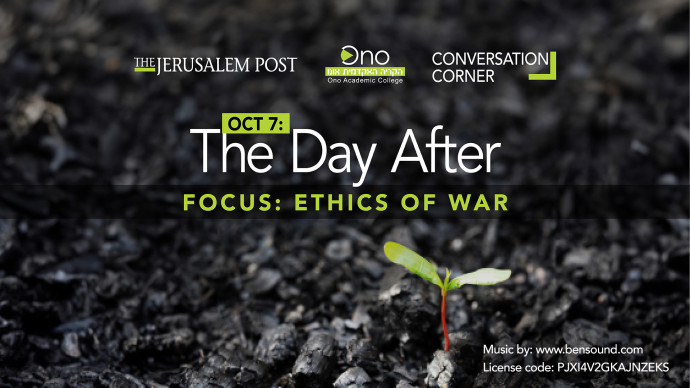According to international law, was Israel justified in retaliating against Hamas after the attacks of October 7? Has Israel’s response been disproportionate?
These and other questions were the focus of a spirited, often fractious panel discussion held between Prof. Dana Pugach, Professor of Criminal Law and Victims’ Rights in Law at Ono Academic College; Prof. Gil Siegal, Director of the Center for Health Law and Bioethics at Ono Academic College; and philosopher Jeff McMahan, Professor of Moral Philosophy at Oxford University. The panel was conducted as part of Ono’s Conversation Corner, a series about the issues the State of Israel will grapple with after the War ends. Maayan Hoffman of the Jerusalem Post moderated the panel.
Learn more about Conversation Corner.
“Israel has a right to take effective action against Hamas, but whether the current war counts as effective action is another question,” McMahan stated.
According to Siegal, there are three sets of rules and norms that one should employ to analyze the situation.

“The first one is a legal question: has Israel met the basic requirements that allow the government to say that its actions are acts of justified self-defense?” he said. “Second is the ethical question. Using Western, Eastern, Muslim, Christian, or whatever set of norms you’re using, am I meeting my standards or my peers’ standards or other civilizations’ standards of ethical conduct in gauging a response to horrific acts of terror? Third is basic intuition. Some things are pure and instinctive and are basic human reactions. And to that, you would ask, ‘What would you do in any similar circumstance,’.”
“These three, I think, should give every rational person an opportunity to reflect and then come up with an answer,” Siegal highlighted.
The professor added that Hamas says that it can resist Israel by whatever horrific means it chooses, but the minute that Israel retaliates, they complain about excessive measures. If Israel can’t dictate to Hamas how they can resist, he said, they certainly can’t complain when Israel retaliates.
“What Hamas has done,” he said, “is completely out of the realm of humane Western behavior. Therefore, I find it extremely hypocritical and untenable to have any complaint on retaliation.”
McMahan noted that in addition to the figures supplied by Hamas of 30,000 dead in Gaza, the United Nations has estimated that some 73,000 civilians have been wounded and that these figures are much higher than Israel’s casualties.
According to Pugach, two significant differences need to be mentioned. First, she said, Israel is a state that complies with the international rules of war. Second, Hamas is holding 134 civilians hostage.
“That’s a game changer for us as a country, because it changes the question of proportionality of the measures that we can take to defend our citizens,” she stressed. “I think that it has to be taken into consideration when asking about proportionality about the measures Israel can or cannot take.”
Siegal, again responding to McMahan’s accusations that Israel has reacted disproportionately, said, in fact, Israel did not perform a blanket bombardment of Gaza. “It has gone road by road, street by street, house by house, being as precise as war allows.” While the number of casualties on the Gazan side is tragic, the responsibility lies with Hamas, who started the War, and with those who voted Hamas into power, he said.
The philosopher posited that Israel’s goal of eliminating Hamas could not be achieved in the conflict.
“War is only going to exacerbate the problem, they are going to hate Israel and Israelis now far more intensely,” he noted, adding that most Gazans were opposed to Hamas and had been in favor of a two-state solution.
“I’m not so sure that we can call most of them innocent people or so that they really did not support Hamas,” Pugach stressed, recalling how many of the hostages who had been freed stated that the Gazans had helped Hamas.
At the conclusion of the discussion, the three participants shared their views on the day after the war.
Siegal expressed his skepticism on the chances of peace, stating that the ability to reach a collaboration for peace requires partners for peace. “If your idea of the good life is dying while exploding ten people, as opposed to nurturing your kid to be a doctor to be a law professor or even a professor for philosophy, it is a divide that will be hard to bridge.”
On her part, Pugach acknowledge that talking about the future is difficult at this time, adding that she has been disillusioned by the world’s response to the events of October 7.
“We always thought of ourselves as being part of the international community,” she said. “We relied on international law, and we thought that people who obey the law would be safe, and that is not true.”
Rounding out the panel, Professor McMahan insisted that ordinary Palestinians in Gaza and the West Bank are like ordinary people everywhere else and do not want their children to become suicide bombers. He recommended that Israelis should see how other disputes in the world, such as those in Northern Ireland and Colombia, were solved and placed the responsibility for solving the conflict on Israel.
“The side that has the power has the greater responsibility to bring that about,” the philosopher concluded.
Siegal demurred, stating that, unlike the conflicts that McMahan had cited, the Israeli-Palestinian divide is primarily a religious conflict.